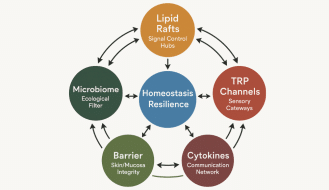7 Ways to Choose the Best Omega-3 Supplement
Read any newspaper, check any grocery aisle, you can’t miss it: omega-3….you know, the stuff in fish that’s supposed to be so good for you. And it is. Truly. But almost no one knows just how good. Of all the omega-3 brands on the market, only one meets the medical standard for active natural bio-ingredients and effective dosing or enough to actually do the job.
The brand? Omega Cure. The only 100% pure, ultra fresh, full-spectrum omega-3 oil in America. It is, by every measurable standard, the best omega-3 supplement you can buy. But don’t take our word for it. Bring this checklist to the store and see for yourself.
Tips for Picking a Good Omega-3 Supplement:
1. Check the EPA/DHA Levels
These are the workhorses of the omega-3 chain. When a major medical study is done on omega-3, it’s actually the EPA/DHA that’s being tested. The efficacy level in almost all worldwide research is set at 2 to 3 grams (2000 to 3000 mg) per day.
Most drug, grocery and health food store supplements offer only 1 gram (1000 mg) of total omega-3 per dose, and considerably less EPA/DHA. A two teaspoon dose of Omega Cure contains 2000 mg of naturally-occurring EPA/DHA, plus 575 mg of other omega-3s. This makes it the most potent natural omega-3 oil on the market, pure and simple.
2. Don’t Mess with Mother Nature
There are only two sources of full-spectrum omega-3 on earth: breast milk and fatty fish. Since it’s almost impossible (as well as now unsafe) to eat enough fresh fish to get the omega-3 you require, you need a supplement that most closely resembles the natural form. That rules out any oil that has been fractionalized, winterized, ethyl-etherized or any other “-ized,” because each “minor modification” creates potential weak links in the fatty acid chain.
The bottom line is this: any fish oil able to survive a hot cargo hold, a musty warehouse, or a fluorescent-lit store shelf for not just months, but years, has got to be good and boiled first. (And we all know what that does to, say, fresh vegetables.)
Even worse than the boiling is the skimming away of any solidifying fat particles, a sleight of hand done not for health, but aesthetic purposes. You see, true fish oil – like any virgin oil – will congeal when refrigerated. Most companies think people like clear oil better, despite losing countless active micro nutrients plus the full family of omega-3s. Who knows? Maybe this skimming (aka: fractionalizing) is why several o-3 studies show that manipulated fish oils offer less than 1/3 the bio-potential of the real deal.
Rest assured, a nice, fresh bottle of chilled Omega Cure is positively thick with user-friendly, full-spectrum omega-3.
3. The Great “Something’s Fishy” Cover Up
Want to know where all the old unsold vats of fish oil go? Not down the drain, that’s for sure.
Low quality fish oil, and even high quality oil that’s gone rancid, are so common that the tricks of the cover-up trade are now the norm: put the oil in capsules and add copious amounts of flavoring, preservatives and emulsion. But bad oil can’t fool a human body. That’s what those “urpy reminders” are all about. With Omega Cure’s extraction process, we deliver an oil so fresh it smells like nothing at all, and is so delightfully drinkable you’ll quickly lose any qualms you may have about taking fish oil.
4. Beware of Inflation
Of course, in this “more is better” world of ours, pharmaceutical “health” companies have been having a field day finding ways to crank up the EPA/DHA numbers. Just remember this: There is a natural order and balance to omega-3. The benefits come as much from that balance as from the “stars” of the omega-3 family. As a rule of thumb, no natural fish oil contains more than 30% EPA/DHA; if a label says it does, it means the oil has been artificially amped up, undermining the delicate balance and bio-interactive power. For example a 1000 mg dose of fish oil would not, in its natural state, have more than 260 mg combined EPA/DHA.
5. Beware of Delusions
Say you find a brand that has omegas 6 and 9 in it too. Wouldn’t that be even better? The manufacturers are hoping you’ll think so. Actually, they’re banking on the fact you’ll be so impressed with all those omegas you won’t stop to think that o-6 (vegetable oil) and o-9 (olive oil) are simply a whole lot cheaper to produce than omega-3.
Even more egregious, they’re presuming you don’t know enough about essential fatty acids to know that the very reason people are in such dire need of omega-3 right now is to compensate for the glut of omega-6 in the Western diet. They could throw in a shot of French fry grease and it wouldn’t be any worse for you than ingesting more omega-6 on a daily basis. Truly. Omega-9, on the other hand, is very healthy in its extra virgin form, but is of no added value mixed in with o-3- its purpose there is to fill the capsule or bottle more cheaply and make you think you’re getting something extra in the deal.
6. Consider the Source
Flax seed oil is another popular form of omega-3. It is a lovely, simple fatty acid, but it contains no EPA/DHA . In a nutshell, Omega Cure can do everything that flaxseed oil can, but flax seed can only do a small part of what fish oil can.
7. Just How Many Doses Do They Expect You To Take?
It’s a very curious thing. Almost every brand of o-3 capsules claims a dose is two a day. Okay, let’s do the math: if a natural fish oil can only give you 260 mg EPA/DHA per gram, then the actual dose required to achieve the levels used to get all the wonderful health benefits you’ve been reading about would be more like 8 to 12 capsules a day. But a detail like that is hardly stimulating to sales. No, better just to let folks think that 1 or 2 capsules is enough. After all, what are the odds you’ll ever read the professional studies showing that a daily dose smaller than 2gram is no more effective than placebo.
Popular posts



Related posts





